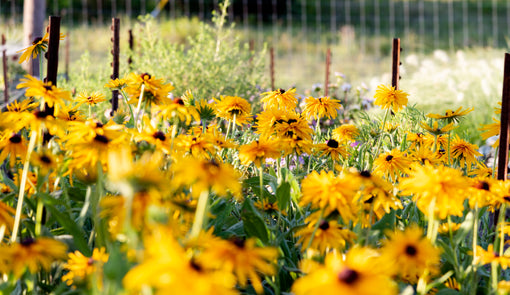
- Article published at:
- Article author: Robin Blood
- Article comments count: 0
Drawer menu
Creating a flourishing flower farm isn't just about nurturing beautiful blooms; it's also about cultivating healthy soil that serves as the foundation for vibrant plant life. At our organic flower farm, nestled in the heart of Godley Texas, we embarked on a transformative journey to improve our soil composition over three years using a No-Till approach. In this blog post, we'll share our experience, insights, and the remarkable outcomes of our commitment to sustainable and regenerative farming practices.
Year 1: Laying the Groundwork for Change
Three years ago, we recognized the need to address soil health on our flower farm. Our journey began with a comprehensive soil test that revealed imbalances in nutrient levels and soil structure. In our area this meant high alkalinity, low organic matter, non-existent phosphorus levels and so much more. Instead of resorting to conventional tilling, which can disrupt the soil ecosystem, we opted for the No-Till approach. By refraining from mechanical tilling, we preserved the intricate web of microorganisms, fungi, and earthworms that play a crucial role in soil fertility. They really are the backbone to our entire farming operation.

In our first year, we implemented cover cropping along with planting flower crops to protect the soil from erosion, fix nitrogen, and improve overall soil structure. By planting a mix of legumes, grasses, and other cover crops, we added organic matter to the soil, which set the stage for the changes to come.
Year 2: Nurturing Biodiversity and Soil Life
The second year saw a more diverse planting strategy as we introduced a wider range of flowering plants. This not only enriched the aesthetic appeal of our farm but also promoted biodiversity above and below the ground. The presence of various plant species encouraged a diverse microbial community, enhancing nutrient cycling and disease resistance.
To further enhance soil composition, we adopted a practice known as "chop and drop." Instead of removing spent plants, we allowed them to decompose directly in the soil, contributing to organic matter and enriching the soil's microbial life. This practice also helps in retaining moisture, which is essential for our arid climate.

Some other soil problems and solutions we came up with are as follows:
High alkalinity: we add 2 pounds of elemental sulfur to every 100 sq. ft of bed every year to help bring down the ph.
Low Phosphorus levels: every seedling is planted with a pinch of bone meal to make up for the deficiencies in soil. We also use buckwheat as a cover crop whenever possible. Buckwheat has a long tap root that fixes nitrogen within the plant so when we use the "chop and drop" method explained above it adds phosphorus back to the top 4" of soil.
Low Organic Matter: We purchase the best quality compost that we can get our hands on in our area roughly 6 months before we plan on needing to use it. This allows the compost to continue to cook and build biodiversity making it more easily assimilated into the soil.
Year 3: Reaping the Rewards
As we entered the third year of our No-Till journey, the transformation in our soil was evident. The texture had improved, becoming looser and more crumbly, allowing for better root penetration and water infiltration. Our soil's nutrient levels had also become more balanced, leading to healthier and more vibrant blooms.
In this phase, we introduced minimal disturbance planting techniques, carefully placing seeds and transplants directly into the ground without disturbing the soil structure. The result was a healthier root system and reduced weed pressure, as disturbed soil often triggers weed germination.

Conclusion: A Sustainable Path to Success
Our three-year journey into No-Till organic flower farming taught us invaluable lessons about patience, observation, and the incredible resilience of nature. By embracing regenerative practices, we not only transformed our soil composition but also ensured the long-term sustainability of our flower farm. No-Till farming empowered us to work hand in hand with nature, creating a haven where both blooms and soil thrive harmoniously. As stewards of the land, we are inspired to continue this journey, advocating for a healthier ecosystem while reaping the beauty of our labor in each exquisite petal that graces our farm.